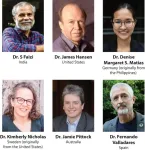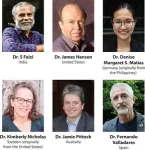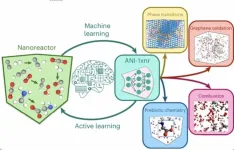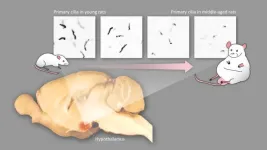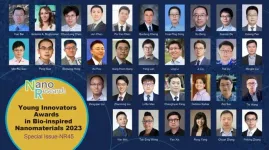(Press-News.org) Corvallis, OR — The Alliance of World Scientists (AWS) is pleased to announce the six recipients of the 2024 Planet Earth Award: Dr. S Faizi, Dr. James Hansen, Dr. Denise Margaret S. Matias, Dr. Kimberly Nicholas, Dr. Jamie Pittock, and Dr. Fernando Valladares.
Planet Earth Award
The AWS Planet Earth Award acknowledges individuals who champion life on Earth. These individuals demonstrate exceptional creativity or contributions in their work in science-based advocacy with the public, policymakers, or other non-scientist groups seeking solutions to environmental challenges.
2024 Laureates
Dr. S Faizi is an eminent environmental scientist and global policy expert from India. He has played a pivotal role in articulating the global South's stance on key environment and development issues, often overcoming opposition from Western negotiators at UN environmental conferences. Dr. Faizi’s accomplishments include important contributions to landmark global events such as the UN Conference on Environment and Development (Earth Summit) and the Convention on Biological Diversity. His efforts have ranged from advocating for national sovereignty over biodiversity to proposing the creation of a UN Environmental Security Council. More recently, this former anti-Apartheid activist has campaigned for nuclear disarmament and democratizing the UN Security Council. He has made significant contributions to forest conservation, biodiversity research, and supporting indigenous rights.
Dr. James Hansen is a prominent climate scientist who lives in the United States. He gained recognition for his pioneering research on climate change during his past work at NASA that continues through today. Dr. Hansen played a key role in raising awareness about the human impact on the Earth's climate, particularly through his testimony before the U.S. Congress. Dr. Hansen has been an advocate for rapid action to mitigate climate change, urging governments and the public to address the environmental challenges facing the planet, and even engaging in non-violent civil disobedience. He continues to work in climate science, as a consultant for youth climate cases, has a climate change newsletter, and recently led a paper assessing global warming in the pipeline.
Dr. Denise Margaret S. Matias, originally from the Philippines, is a Professor at Eberswalde University for Sustainable Development in Germany, and a notable advocate for environmental policies. She has worked to preserve honey bee diversity and carried out a project with the Tagbanua Indigenous people to restore giant honey bee habitat by planting native species. She has also worked extensively with environmental groups, including Conservation International and Greenpeace Southeast Asia. In addition to ecology, Dr. Matias has published work on climate adaptation and slow-onset climate events. Dr. Matias has consistently prioritized outreach and science-based advocacy through interviews, social media, and presentations to diverse audiences.
Dr. Kimberly Nicholas, originally from the United States, is a sustainability scientist at Lund University in Sweden and a prominent figure in the field of climate and sustainability. She has published many articles in leading peer-reviewed journals, and also contributes to mainstream publications like Elle, The Guardian, Scientific American, and New Scientist. Dr. Nicholas is author of the bestselling book "Under the Sky We Make: How to be Human in a Warming World” and she shares her insights through a monthly climate newsletter, “We Can Fix It.” Apart from her academic contributions, Dr. Nicholas is actively engaged in public speaking and frequently lectures at international meetings. Additionally, she serves as an expert commentator for many media interviews annually, and her work has been featured in outlets including The Washington Post, BBC, WIRED, and Politico.
Dr. Jamie Pittock is a Professor at the Australian National University and former Director of the World Wide Fund for Nature – International’s Global Freshwater Program. He is a dedicated champion of freshwater conservation, making impactful strides through his academic studies and science-based communications to colleagues, policy makers, and the public. Through outreach efforts with books, blogs, presentations, and videos, he communicates the urgency of conserving freshwater ecosystems and biodiversity in the context of the pressing challenges posed by climate change. He consistently offers informed commentary on how to better manage increasingly scarce water resources to benefit people and nature. His commitment to bridging academic research with practical solutions underscores his role as a catalyst for positive change in freshwater conservation, providing significant impacts linking scientific understanding to public and policy engagement.
According to AWS Director Dr. William Ripple, a scientist at the Conservation Biology Institute and Distinguished Professor at Oregon State University, “These Planet Earth Award recipients provide compelling examples of how scientists can engage in effective science-based advocacy to help address important environmental issues. We hope they will inspire others to act in this regard.”
The Alliance of World Scientists
The AWS is a new international assembly of scientists, which is independent of both governmental and non-governmental organizations and corporations. The main goal of the AWS is to be a collective international voice of many scientists regarding global climate and environmental trends and how to turn accumulated knowledge into action. The AWS currently has 27,000 Subscribing Members From 180 Countries.
The AWS gratefully acknowledges the support of our partner the Conservation Biology Institute and the support of our donors.
END
The Alliance of World Scientists announces 2024 Planet Earth Award laureates
2024-03-13
ELSE PRESS RELEASES FROM THIS DATE:
Staying in the loop: how superconductors are helping computers “remember”
2024-03-13
Computers work in digits — 0s and 1s to be exact. Their calculations are digital; their processes are digital; even their memories are digital. All of which requires extraordinary power resources. As we look to the next evolution of computing and developing neuromorphic or “brain like” computing, those power requirements are unfeasible.
To advance neuromorphic computing, some researchers are looking at analog improvements. In other words, not just advancing software, but advancing hardware too. Research from the University of California San Diego and UC Riverside shows a promising new way to store and transmit information ...
SMU chemist and colleagues develop machine learning model for atomic-level interactions
2024-03-13
DALLAS (SMU) – What exactly happens at the tiny scale at which individual atoms exist and interact? SMU chemist Elfi Kraka and her colleagues have been working on developing a computational tool aimed at providing answers to that mystery.
Mathematical functions used to calculate the potential energy of a system of atoms are called interatomic potentials. Machine learning interatomic potentials (MLIP)s have become an efficient and less expensive alternative to traditional quantum chemical simulations, which even on today’s high-performance computing often become out of reach for larger ...
Breastfeeding mothers who exercise pass on a beneficial hormone to their children
2024-03-13
Although women have breastfed since the beginning of time, there is very little scientific research on how exercise affects breast milk.
Online forums for pregnant women and new mothers are full of questions about this exact issue:
Can exercise cause breast milk to go sour? What happens to breast milk if you do high-intensity interval training? Will strenuous exercise affect your milk supply?
“There are so many myths about exercise and breast milk. We simply need more knowledge,” says researcher Trine Moholdt at the Norwegian University of Science and Technology (NTNU).
She heads several international research projects ...
Christiana Wang, BS is the recipient of the 2024 ACMG Foundation/David L. Rimoin Inspiring Excellence Award
2024-03-13
The ACMG Foundation for Genetic and Genomic Medicine is proud to present the ACMG Foundation/David L. Rimoin Inspiring Excellence Award to Christiana Wang, BS for her featured platform presentation at the 2024 ACMG Annual Clinical Genetics Meeting, “Antisense oligonucleotide targeting a linked-SNP provides allele-specific and effective knockdown to a dominant negative SPTAN1 pathogenic variant.”
Christiana Wang, BS, is a second-year PhD candidate in the Department of Molecular ...
New research at Georgia Aquarium helps conserve endangered beluga whales in Alaska
2024-03-13
ATLANTA – New data provided by studying the beluga whales at Georgia Aquarium helps close a key information gap about how much food these whales need to thrive. The information will inform important management decisions for their counterparts in Alaska’s Cook Inlet, which are protected under the U.S. Endangered Species Act (ESA).
A new study released in the Journal of Experimental Biology, led by Terrie M. Williams, Director of the Integrative Carnivore EcoPhysiology Lab, with her graduate student Jason John at the University of California-Santa Cruz in partnership ...
Federal housing programs protect residents from lead exposure
2024-03-13
Americans already living in housing supported by federal housing assistance programs have significantly lower blood lead levels than counterparts who would later join these programs, according to new research led by environmental health scientists at Columbia University Mailman School of Public Health and Tufts Medical Center. The findings appear in the peer-reviewed journal Environmental Health Perspectives.
“Living in federally-supported housing—especially public housing—limited opportunities for residents’ exposure to lead,” says first author MyDzung Chu, Ph.D., assistant professor in the Institute for ...
Curbing coal-burning emissions translates to health gains for children
2024-03-13
Residential heating by coal has for decades been the major contributor to the high levels of air pollution in Krakow, Poland. New research finds a nearly 40 percent decline in the annual average concentration of respirable particulate matter (PM2.5) in Kraków, Poland, between 2010 and 2019 following the implementation of policies targeting emissions from the burning of coal and other solid fuels. Researchers show the improvement in air quality translated to substantial benefits for children’s outcomes, including fewer cases of asthma and better birth outcomes.
The ...
Middle-age obesity is caused by changes in the shape of neurons in the brain
2024-03-13
Nagoya University researchers and their colleagues in Japan have found that middle-age obesity is caused by age-related changes in the shape of neurons in the hypothalamus, a region of the brain that controls metabolism and appetite.
A protein called melanocortin-4 receptor (MC4R) detects overnutrition and regulates metabolism and appetite to prevent obesity. According to their study in rats, MC4Rs were concentrated in primary cilia (antenna-like structures) that extend from a couple of groups of hypothalamic neurons. The study also showed that the primary cilia became shorter with age, which decreased MC4Rs accordingly, ...
2023 Nano Research Young Innovators (NR45) Awards in Bio-inspired Nanomaterials
2024-03-13
Recently, Nano Research announced awardees of the 2023 Nano Research Young Innovators (NR45) Awards in Bio-inspired Nanomaterials. Thirty-three outstanding young investigators under the age of 45 were selected for their extraordinary contributions in developing bio-inspired nanomaterials with applications spanning clean energy, human healthcare, monitoring, and disease treatments. They were selected through a competitive process by an award committee from Nano Research’s editorial board. Congratulations to all the 33 awardees in 2023!
The NR45 Awards ...
KIMM finds solution to medical waste problem, which has become a major national issue
2024-03-13
A medical waste treatment system, which is capable of 99.9999 percent sterilization by using high-temperature and high-pressure steam, has been developed for the first time in the country.
The Korea Institute of Machinery and Materials (President Seog-Hyeon Ryu, hereinafter referred to as KIMM), an institute under the jurisdiction of the Ministry of Science and ICT, has succeeded in developing an on-site-disposal type medical waste sterilization system that can help to resolve the problem caused by medical waste, which has become a national and social issue as the volume of medical waste continues ...
